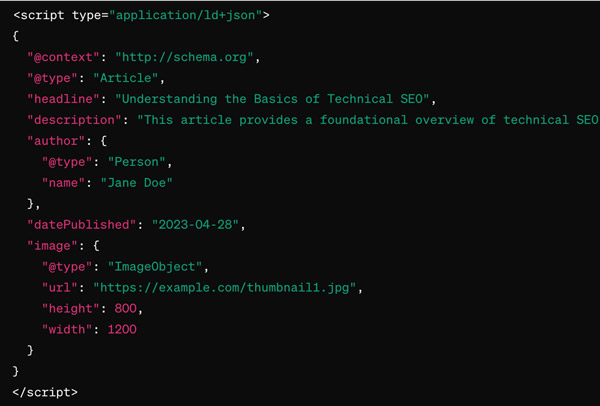
In the vast and ever-evolving landscape of search engine optimization (SEO), the utilization of structured data stands out as a powerful tool, significantly enhancing how search engines perceive and process the content of your website. At its core, structured data involves implementing a standardized format to annotate elements on a webpage. This formatting helps search engines like Google, Bing, and others to not only crawl your site more effectively but also understand the types of information presented, whether they are articles, products, or events.
The integration of structured data into your web pages can yield tangible benefits, primarily through the generation of rich snippets. These snippets enhance the appearance of your search results, potentially featuring star ratings, pricing information, or availability directly in the search engine results pages (SERPs). Such enhancements not only make your listings more attractive but also increase the likelihood of clicks, driving more traffic to your site.
Additionally, structured data paves the way for your content to qualify for special SERP features and knowledge panels, which can further boost visibility and user engagement. From an SEO perspective, this is a critical advantage as it positions your website as a reliable source of information and can significantly improve your overall search presence.
This article delves into the technical aspects of structured data, providing you with the knowledge to implement and leverage this powerful SEO tool effectively. Whether you’re looking to enhance existing content or build a new strategy from the ground up, mastering structured data can be a game-changer for your website’s search engine performance. Let’s explore how you can harness the power of structured data to set your site apart in the competitive digital arena.
Structured Data Fundamentals
Structured data is an organized format to provide information about a page and classify the page content. If we were to compare websites to libraries, structured data would be akin to the Dewey Decimal system, categorizing and indexing information so that search engines can find and understand it quickly. Essentially, structured data speaks directly to search engines in a language they can understand, indicating the content's nature and purpose.
Schema Markup: The Role of Schema.org in Standardizing Data
One of the pillars of structured data is Schema markup, powered by Schema.org. This collaborative community activity, founded by major search engines like Google, Microsoft, and Yahoo, aims to create and support a common set of schemas for structured data markup on web pages. Schema.org provides a vocabulary that webmasters can use to markup their pages in ways recognized by major search providers, enhancing the display of search results, making it easier for people to find the right web pages.
Using schema markup, a website can detail to a search engine what its content is about, whether it’s articles, local businesses, restaurants, TV show reviews, or anything else. This clarity helps search engines to index the website more effectively and serve more relevant results to users.
JSON-LD: Leveraging JSON for Linking Data
JSON-LD stands for JavaScript Object Notation for Linked Data. It is a method used to encode structured data by embedding it in a script tag in the head or body of an HTML page. JSON-LD is highly favored among web developers due to its ease of implementation and the clarity it brings to the structured data contexts. The format is designed not only to be easily readable by humans but also efficiently processed by machines.
The advantages of JSON-LD are numerous. It simplifies the developer’s task by allowing data to be scripted in a way that is separate from the HTML markup. This separation ensures that changes to the visual elements of a webpage don't necessitate alterations to the structured data, thereby reducing maintenance overhead and minimizing the risk of errors. Additionally, JSON-LD can be added to a page without disrupting the existing HTML, making it a go-to choice for enhancing pages with structured data without a complete overhaul.
Implementing JSON-LD involves embedding a script with the JSON-LD format in the head of an HTML document. The script specifies the types of data structured according to Schema.org vocabulary—whether you’re detailing a product, person, organization, or event. This script provides search engines with the detailed data they need to understand the content of the page comprehensively and serve it against relevant queries efficiently.
Schema Markup Example
Here’s a simple example of what schema markup using JSON-LD format might look like for a basic article on a website:

In this snippet:
- The @context provides the vocabulary (schema.org), and @type specifies that the data pertains to an article.
- The headline, description, and other properties describe various aspects of the article.
- The author is marked as a Person object, which includes the author's name.
- datePublished specifies when the article was published.
- image provides details about an image associated with the article, including its URL and dimensions.
This structured data helps search engines understand the content of the page, which could potentially enhance the article's visibility in search results, particularly for rich snippets or other enhanced displays.
Common Schema Types & Use Cases
Structured data and schema markup are integral to conveying detailed information about your website's content to search engines. This not only helps in better indexing but also enhances the display of your content in search results. Let's dive into some of the most commonly used schema types and their specific applications across various types of content.
Product Schema: Enhancing E-commerce Visibility
The Product schema is crucial for e-commerce websites, allowing them to provide detailed information about their products directly in search results. Key elements within the Product schema include the name, price, availability, and review ratings of the product. Implementing this schema correctly can lead to the display of rich snippets that include these details, making product listings more appealing and informative to potential buyers. For instance, when a user searches for a product, a well-implemented Product schema can show the product with its price, availability status, and star ratings right on the SERP, thereby increasing the likelihood of a click-through.
Article Schema: Tailoring Data for Content Publishers
For publishers dealing with news, blogs, or articles, the Article schema helps communicate to search engines what your content is about. This schema can include the headline, author, date published, and a specific section of the content. Best practices for implementing Article schema involve ensuring that each piece of content is accurately described, using tags like NewsArticle or BlogPosting to provide more specific context. This detailed markup helps in enhancing the visibility of articles in search results and can also contribute to features like Google's Top Stories.
Event Schema: Boosting Event Discoverability
The Event schema is invaluable for promoting events through search engines. This schema type can detail events including concerts, webinars, or community gatherings, encompassing elements such as the event's name, start date, location, and ticket information. By marking up events with this schema, you can enhance the event's visibility and make key information accessible directly within search results, encouraging higher engagement and attendance rates.
Recipe Schema: A Chef's Digital Assistant
For culinary content publishers, the Recipe schema allows for a detailed representation of recipes in search results. Elements like ingredients, cook time, nutrition information, and step-by-step instructions can be included. This not only helps in attracting cooking enthusiasts through visually appealing rich snippets but also can integrate with voice-assisted devices which read out recipes step-by-step, making your content more accessible.
FAQ and Local Business Schema: Quick Info at a Glance
Briefly, the FAQ schema is designed to display common questions and answers related to a particular topic directly in search results, which can be a great way to address common customer inquiries upfront. This schema type is particularly useful for informational and support sections of websites.
Similarly, the Local Business schema helps local businesses stand out in search results by providing essential information like business hours, contact information, and physical address. This schema is a cornerstone of local SEO, helping businesses increase their local presence and attract more foot traffic by enhancing local search visibility.
Each of these schema types serves a unique purpose and, when implemented effectively, can significantly enhance the visibility and user engagement of your website's content in search results.
The Impact of Structured Data on SEO
Structured data is a potent tool in the SEO toolkit, offering numerous benefits that go beyond mere compliance with search engine standards. It directly influences how content is indexed and displayed, leading to a more interactive and informative user experience. Let’s explore how structured data can elevate your website’s presence in SERPs.
Rich Snippets: Driving Engagement Through Detailed Listings
Rich snippets are enhanced search results that provide additional data about the content of a page, prominently displayed due to structured data. For example, rich snippets for recipes can display star ratings, cooking time, and calorie counts, while product rich snippets might show pricing, availability, and reviewer ratings. These detailed listings make the snippet stand out in a sea of text-only results, significantly improving the click-through rates (CTRs) by catching the eye of the searcher with more compelling, useful information. Higher CTRs not only drive more traffic but also signal to search engines that users find the content valuable, potentially boosting the rankings.
SERP Features: Gaining Visibility Through Knowledge Panels and Carousels
Structured data also plays a crucial role in how content qualifies for special SERP features like Knowledge Panels and carousels. Knowledge Panels can display a wealth of information such as details about a business, person, or event, directly in the SERPs, drawing from structured data to populate the information. Similarly, carousels can showcase multiple items, such as a list of products or articles, providing a visually engaging experience that allows users to scroll horizontally through the content. These features not only enhance visibility but also position your content as authoritative and trustworthy, which is essential in competitive search environments.
User Experience (UX): Enhancing Interaction with Search Results
Well-structured data improves user experience on search result pages by presenting content in a more organized and digestible format. When users are able to quickly identify the relevance of a result through rich snippets or special features, their search experience becomes more efficient and satisfying. This level of clarity and enhanced display can reduce bounce rates and encourage deeper engagement with the site’s content, as users feel more confident about the relevance and quality of the information before they even click through to the website.
Enhanced Search Visibility: Long-Term SEO Benefits
Implementing structured data is a forward-looking strategy that can yield long-term SEO benefits. Beyond the immediate improvements in visibility and user engagement, structured data helps search engines better understand the content and context of your site's pages, which can improve overall relevance and accuracy in search results. This deeper understanding can lead to better keyword rankings and a stronger presence in related searches. Moreover, as search engines evolve to focus more on semantic search capabilities, having a robust structured data setup positions your website favorably for future algorithm updates, ensuring that your content remains relevant and highly discoverable.
Enhance Your Technical SEO with the Right Partner
Structured data is a critical component of technical SEO that offers a multitude of benefits, from enhancing the visibility of your web content in search engine results pages to improving user engagement through rich snippets and special SERP features.
The journey of implementing and optimizing structured data is ongoing. Search engines continually update their algorithms and the way they interpret and utilize structured data. Staying informed about these changes is crucial. Marketers and website owners should invest in continuous learning and adaptation to these evolving standards to fully leverage the potential of structured data. This entails regularly reviewing your site’s markup, keeping abreast of updates from Schema.org, and using tools provided by search engines to test and refine your structured data implementation.
Mastering structured data is not a one-time task but a dynamic component of SEO that requires ongoing attention and refinement. By staying proactive and educated on structured data trends and best practices, you can ensure that your website not only keeps up with the current landscape but also anticipates future developments, maintaining its competitive edge in the digital marketplace.
The SEO team at Roger West is always looking under the digital hood to find opportunities to optimize the technical details that drive website performance. We make sure our client’s sites have the right structured data and schemas in place to enhance search engine visibility and provide a seamless user experience.
Need to make sure your site’s technical SEO details are all buttoned up? Let’s talk.

